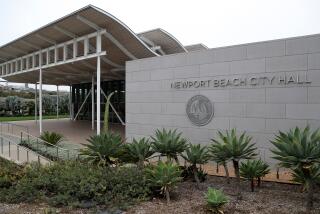Marine Institute Expansion to Proceed
- Share via
DANA POINT — The City Council, deadlocked over whether to allow the Orange County Marine Institute to shed its quasi-governmental status and become a private agency, no longer needs to approve the change and will not be asked to vote on the issue again, the institute’s executive director said Friday.
The institute consulted its attorney and was advised that the City Council’s previous approval on a related matter, 10 months ago, is sufficient for the marine facility to proceed with expansion plans.
“The issue with the City Council is over with,” said Stanley Cummings, the institute’s director. “We have not concluded the final steps to becoming a private, nonprofit agency yet, but we expect to do so within 30 days.”
The institute first went to the City Council last November and won approval for a “memorandum of understanding,” to privatize by a 3-to-2 vote.
However when it came time to vote on whether to dissolve a joint-powers agreement and allow the institute to become a private, nonprofit agency this year, the City Council deadlocked, 2 to 2. Mayor Karen Lloreda said she could not vote because of a potential conflict of interest arising from her carpenter husband’s job of building cabinets and working on other projects at the institute.
It was the first of seven tie votes over a six-month period that council members failed to take action on the institute’s situation.
Cummings said the stalemate had jeopardized the marine facility’s plans to undertake a $25-million expansion scheduled to begin in 1997. The institute, which is governed by seven public agencies under a joint-powers agreement, needed approval from each to convert to a private, nonprofit agency.
Cummings said the institute has already won approval from six of the seven agencies. The final approval and final link to begin the institute’s fund-raising campaign was Dana Point.
But a recent legal review, Cummings said, found that City Council approval is now not needed. The institute will go ahead and transfer funds from the board of directors of the Orange County Marine Institute to the Friends of the Marine Institute of Orange County, the facility’s nonprofit, private support group, he said.
The institute plans to postpone dissolving the Orange County Marine Institute’s old board, which is the joint-powers authority.
“We have legal indication that we have all the rights to move ahead,” said Bill Habermehl, chairman of the institute’s board of directors, who is also on the executive committee of the Friends of the Marine Institute. “And, we’re confident we will have three [City Council] members favoring the marine facility’s request because Karen Lloreda’s conflict will be up early next year and she can eventually vote on the matter.”
Habermehl also noted that two council seats, including one held by Councilman Bill Ossenmacher, the institute’s chief critic, are up for election in November.
The most recent deadlock came last month on a proposal to let Dana Point voters decide the issue in November. Ossenmacher, who proposed the ballot measure, argued that residents should decide the matter because the institute is a public asset.
But Councilwoman Judy Curreri, who supports the institute’s privatization, said there was no reason the council should consider the ballot issue because the institute serves Southern California, making it a “regional issue.”
The deadlock has involved council members Ossenmacher and Toni Gallagher opposing the privatization, against Curreri and Harold R. Kaufman.
Ossenmacher has criticized the institute’s transition from a public to private agency, arguing that it should involve open bids, including accepting bids from other established aquariums to take over the institute’s lease on the county-owned property.
Ossenmacher could not be reached for comment.
It could not be determined Friday whether a challenge might be mounted.
“We very much want to be a partner with the city,” Habermehl said, “and we know we will. We just simply have two City Council members who don’t support our view and that, with time, will change.”
Established in 1977, the marine facility began as a joint-powers authority with six agencies spending about $1 million in seed money. The facility’s operating budget, now about $1.4 million yearly, is financed through tuition and donations.
Plans call for expanding the 5,500-square-foot building tenfold to include a simulated underwater research lab where students can spend the night, studying sea life surrounded by a 600,000-gallon tank.
More to Read
Sign up for Essential California
The most important California stories and recommendations in your inbox every morning.
You may occasionally receive promotional content from the Los Angeles Times.










